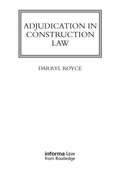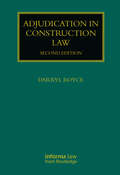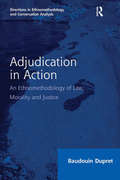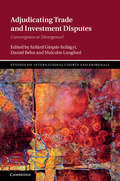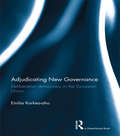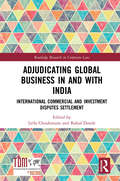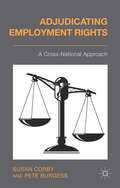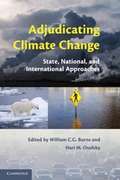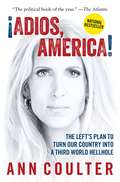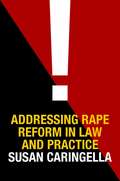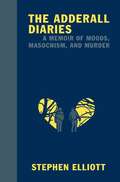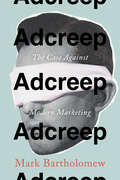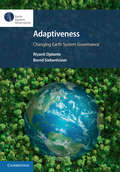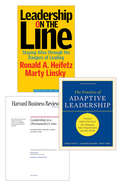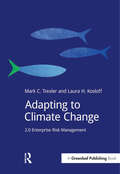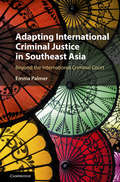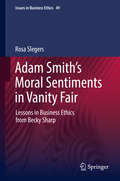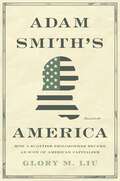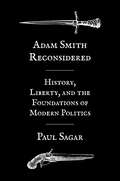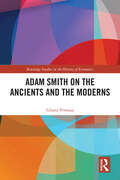- Table View
- List View
Adjudication in Construction Law (Construction Practice Series)
by Darryl RoyceThis book brings together, in one convenient place, all the relevant material on the process of Adjudication in Construction. It will provide clarity for those involved in the adjudication process, or related proceedings, in the form of a detailed and reliable text that supports each proposition with a statutory provision or a judicial observation. Included in this book is a summary of the different procedures adopted in other jurisdictions, as well as a chronological account of the reviews and proposals for reforms made to Part II of the Housing Grants, Construction and Regeneration Act 1996. There is also an explanation of the payment procedures under the statutory framework. Finally, readers will be able to make use of appendices comprised of the statutory material, the various contractual adjudication procedures currently available, and necessary forms. Any lawyers or construction professionals involved in Adjudication will find this book to be a clear and comprehensive aid to their practice.
Adjudication in Construction Law (Construction Practice Series)
by Darryl RoyceThis book collects all the relevant material regarding the process of adjudication in construction. It provides clarity for those involved in the adjudication process or related proceedings with detailed and reliable analysis of them supported by statutory provisions and judicial observations. Adjudication in Construction Law discusses the role of ‘true value’ adjudications following smash and grab decisions on the basis of the absence of a pay less notice, the restraint of adjudication by injunction, hybrid contracts dealing with both construction operations and other operations and timing and content of payment notices and pay less notices. Additionally, this book includes a summary of the different procedures adopted in other jurisdictions, as well as an explanation of the payment procedures under the statutory framework. It also goes on to append all the relevant statutory material, contractual adjudication procedures and forms. A new feature of this edition is a detailed analysis and discussion of the development and of the ‘rules’ relating to the acceptability of a wrong answer provided that the right question has been dealt with, only one dispute being susceptible to adjudication and the necessity or otherwise of a dispute ‘arising under’ the construction contract. A clear and comprehensive aid, this book is an essential read for lawyers or construction professionals involved in adjudication.
Adjudication in Action: An Ethnomethodology of Law, Morality and Justice (Directions in Ethnomethodology and Conversation Analysis)
by Baudouin DupretAdjudication in Action describes the moral dimension of judicial activities and the judicial approach to questions of morality, observing the contextualized deployment of various practices and the activities of diverse people who, in different capacities, find themselves involved with institutional judicial space. Exploring the manner in which the enactment of the law is morally accomplished, and how practical, legal cognition mediates and modulates the treatment of cases dealing with sexual morality, this book offers a rich, praxeological study that engages with 'living' law as it unfolds in action. Inspired by Wittgenstein's later thought and engaging with recent developments in ethnomethodology and conversation analysis, Adjudication in Action challenges approaches that reduce the law to mere provisions of a legal code, presenting instead an understanding of law as a resource that stands in need of contextualization. Through the close description of people's orientation to and reification of legal categories within the framework of institutional settings, this book constitutes the first comprehensive study of law in context and in action.
Adjudicating Trade and Investment Disputes: Convergence or Divergence? (Studies on International Courts and Tribunals)
by Gáspár-Szilágyi Szilárd Daniel Behn Malcolm LangfordRecent trends suggest that international economic law may be witnessing a renaissance of convergence – both parallel and intersectional. The adjudicative process also reveals signs of convergence. These diverse claims of convergence are of legal, empirical and normative interest. Yet, convergence discourse also warrants scepticism. This volume contributes to both the general debate on the fragmentation of international law and the narrower discourse concerning the interplay between international trade and investment, focusing on dispute settlement. It moves beyond broad observations or singular case studies to provide an informed and wide-reaching assessment by investigating multiple standards, processes, mechanisms and behaviours. Methodologically, a normative stance is largely eschewed in favour of a range of 'doctrinal,' quantitative and qualitative methods that are used to address the research questions. Furthermore, in determining the extent of convergence or divergence, it is important to recognize that there is no bright line or clear yardstick for determining its nature or degree.
Adjudicating Refugee and Asylum Status
by Benjamin N. Lawrance Galya RufferIn this book, an array of legal, biomedical, psychosocial, and social science scholars and practitioners offer the first comparative account of the increasing dependence on expertise in the asylum and refugee status determination process. This volume presents a comprehensive study of the relevance of experts, as mediators of culture, who are called upon to corroborate, substantiate credibility, and serve as translators in the face of confusing legal standards that require proof of new forms and reasons for persecution around the globe. The authors draw upon their interactions with expertise and the immigration process to provide insights into the evidentiary burdens on asylum seekers and the expanding role of expertise in the forms of country-conditions reports, biomedical and psychiatric evaluations, and the emerging field of forensic linguistic analysis in response to emerging forms of persecution, such as gender-based or sexuality-based persecution. This book is essential reading for both scholars interested in the production of knowledge and clinicians considering the role of experts as mediators of asylum claims.
Adjudicating New Governance: Deliberative Democracy in the European Union
by Emilia Korkea-ahoThis book engages with and advances the current debate on new governance by providing a much-needed analysis of its relationship with the courts. New modes of governance have produced a plethora of instruments and actors at various levels that present a challenge to more traditional forms of command-and-control regulation. In this respect, it is commonly maintained that new governance generally – and political experimentation more broadly – weakens the power of the courts, producing a legitimacy problem for new forms of governance and, perhaps more fundamentally, for law itself. Focusing on the European Union, this book offers a new account of the role of the courts in new governance. Connecting new governance with the conception of deliberative democracy, this book demonstrates how the role of courts has been transformed by the legal and political experimentation currently taking place in the European Union. Drawing on a series of case studies, it is argued that, although deliberations in governance frameworks provide little by way of hard, binding law, these collaborative frameworks nevertheless condition judicial decision making. With far-reaching implications for how we understand the justiciability of ‘soft law’, participation rights, the legitimacy of governance measures, and the role of courts beyond the nation-state, this book argues that, far from undermining the power of the courts, governance regimes assist their functioning. Its analysis will therefore be of considerable interest for lawyers, political scientists and anyone interested in the transformation of the judiciary in the era of new governance.
Adjudicating Global Business in and with India: International Commercial and Investment Disputes Settlement (Routledge Research in Corporate Law)
by Leïla Choukroune and Rahul DondeThis edited collection on international commercial and investment disputes in, and with, India examines past and present landmark legislative and regulatory reforms initiated by the Indian government, including the 2015 new Bilateral Investment Treaty (BIT) model, the 2015 amendments to the 1996 Arbitration Act and the 2013 amendments to Section 135 of the Companies Act on Corporate Social Responsibility (CSR), as well as the most recent amendments to the same. The book also includes recent developments in the dispute resolution arena, regional, and international negotiations involving India, the legal profession’s response to these developments, and civil society’s comments. In addition, it addresses contemporary problems of key importance and at the centre of today’s discussions, from the legitimacy and relevance of Investor–State Dispute Settlement (ISDS) to the denunciation of Bilateral Investment Treaties (BITs), and the role arbitration should play in emerging economies now leaders in world trade. In creating bridges between commercial and investment arbitration, it also renews the conceptual approach to these too often artificially isolated fields of law. The volume provides an accurate and updated account of the many fascinating conceptual and practical evolutions, which already impact the world of international dispute resolution far beyond the borders of India. This unique and exhaustive study will be of great appeal to a vast range of readers from practitioners to academia.
Adjudicating Employment Rights
by Susan Corby Pete BurgessAdjudicating Employment Rights compares and analyses institutions for resolving employment rights disputes in ten countries. In addition to detailed individual chapters, the study offers a theoretical perspective and an evaluation of national institutions against key yardsticks.
Adjudicating Climate Change: State, National, and International Approaches
by William C. G. Burns Hari M. OsofskyCourts have emerged as a crucial battleground in efforts to regulate climate change. Over the past several years, tribunals at every level of government around the world have seen claims regarding greenhouse gas emissions and impacts. These cases rely on diverse legal theories, but all focus on government regulation of climate change or the actions of major corporate emitters. This book explores climate actions in state and national courts, as well as international tribunals, in order to explain their regulatory significance. It demonstrates the role that these cases play in broader debates over climate policy and argues that they serve as an important force in pressuring governments and emitters to address this crucial problem. As law firms and public interest organizations increasingly develop climate practice areas, the book serves as a crucial resource for practitioners, policymakers, and academics.
¡Adios, America!: The Left's Plan to Turn Our Country into a Third World Hellhole
by Ann CoulterAnn Coulter is back, more fearless than ever. In ¡Adios, America! she touches the third rail in American politics, attacking the immigration issue head-on and flying in the face of La Raza, the Democrats, a media determined to cover up immigrants' crimes, churches that get paid by the government for their "charity," and greedy Republican businessmen and campaign consultants--all of whom are profiting handsomely from mass immigration that's tearing the country apart. Applying her trademark biting humor to the disaster that is U. S. immigration policy, Coulter proves that immigration is the most important issue facing America today.
Addressing Rape Reform in Law and Practice
by Susan CaringellaThe first comprehensive book on rape since Susan Brownmiller's Against Our Will and Susan Estrich's Real Rape, this volume probes every aspect of rape law and the discrepancies between ideal law (on the books) and real law (in action). Susan Caringella canvasses the success and failure of reform in the United States, as well as Australia, Britain, Canada, and New Zealand, and assesses alternative perspectives on rape reform, making use of theoretical models, court cases and statistical data. She uniquely delineates a creative model for change while addressing the discretion that undermines efforts at change. This includes charging the accused and plea bargaining, confronting a lack of transparency and accountability in implementing law, and acquiring funding for such changes.
Addressing Environmental and Food Justice toward Dismantling the School-to-Prison Pipeline: Poisoning and Imprisoning Youth
by John Lupinacci Anthony J. Nocella K. Animashaun DucreThis cutting-edge collection of essays presents to the reader leading voices within food justice, environmental justice, and school to prison pipeline movements. While many schools, community organizers, professors, politicians, unions, teachers, parents, youth, social workers, and youth advocates are focusing on curriculum, discipline policies, policing practices, incarceration demographics, and diversity of staff, the authors of this book argue that even if all those issues are addressed, healthy food and living environment are fundamental to the emancipation of youth. This book is for anyone who wants to truly understand the school to prison pipeline as well as those interested in peace, social justice, environmentalism, racial justice, youth advocacy, transformative justice, food, veganism, and economic justice.
Addressing Emerging Trends to Support the Future of Criminal Justice: Findings of the Criminal Justice Technology Forecasting Group
by John S. Hollywood Dulani Woods Andrew Lauland Brian A. Jackson Richard SilberglittThe Criminal Justice Technology Forecasting Group (CJTFG) deliberated on the effects that major technology and social trends could have on criminal justice in the next two to five years and identified potential responses. This report captures the results of the group’s meetings and initiatives, presents the emerging trends and highlights of the group’s discussion, and presents the results of analyses to assess connections between the trends.
The Adderall Diaries: A Memoir of Moods, Masochism, and Murder
by Stephen ElliottHans stands accused of murdering his wife, Nina. Despite of circumstantial evidence against him, he proclaims his innocence. The case takes a twist when Nina's former lover, and Hans's former friend, Sean confesses to eight unrelated murders.
Adcreep: The Case Against Modern Marketing
by Mark BartholomewAdvertising is everywhere. By some estimates, the average American is exposed to over 3,000 advertisements each day. Whether we realize it or not, "adcreep"—modern marketing's march to create a world where advertising can be expected anywhere and anytime—has come, transforming not just our purchasing decisions, but our relationships, our sense of self, and the way we navigate all spaces, public and private. Adcreep journeys through the curious and sometimes troubling world of modern advertising. Mark Bartholomew exposes an array of marketing techniques that might seem like the stuff of science fiction: neuromarketing, biometric scans, automated online spies, and facial recognition technology, all enlisted to study and stimulate consumer desire. This marriage of advertising and technology has consequences. Businesses wield rich and portable records of consumer preference, delivering advertising tailored to your own idiosyncratic thought processes. They mask their role by using social media to mobilize others, from celebrities to your own relatives, to convey their messages. Guerrilla marketers turn every space into a potential site for a commercial come-on or clandestine market research. Advertisers now know you on a deeper, more intimate level, dramatically tilting the historical balance of power between advertiser and audience. In this world of ubiquitous commercial appeals, consumers and policymakers are numbed to advertising's growing presence. Drawing on a variety of sources, including psychological experiments, marketing texts, communications theory, and historical examples, Bartholomew reveals the consequences of life in a world of non-stop selling. Adcreep mounts a damning critique of the modern American legal system's failure to stem the flow of invasive advertising into our homes, parks, schools, and digital lives.
Adaptiveness: Changing Earth System Governance
by Bernd Siebenhüner Riyanti DjalanteRapid and transformational actions are ever more urgently needed to achieve a just, resilient, and ecologically sustainable global society, as envisioned and supported by the Sustainable Development Goals. Moreover, dynamic governance approaches are vital for addressing changing and uncertain conditions. At many levels, governance needs to be responsive and flexible - in one word - adaptive. This book provides a state-of-the-art review of the conceptual development of adaptiveness as a key concept in the environmental governance literature, complemented by applications from global, regional, and national levels. It reviews the politics of adaptiveness, investigates which governance processes foster adaptiveness, and discusses how, when and why adaptiveness influences earth system governance. It is a timely synthesis for students, researchers and practitioners interested in environmental governance, sustainability and social change processes. This is one of a series of publications associated with the Earth System Governance Project. For more publications, see www.cambridge.org/earth-system-governance.
Adaptive Mediation and Conflict Resolution: Peace-making in Colombia, Mozambique, the Philippines, and Syria (Sustainable Development Goals Series)
by Cedric De Coning Ako Muto Rui SaraivaThis open access book introduces adaptive mediation as an alternative approach that enables mediators to go beyond liberal peace mediation, or other determined-design models of mediation, in the context of contemporary conflict resolution and peace-making initiatives. Adaptive mediation is grounded in complexity theory, and is specifically designed to cope with highly dynamic conflict situations characterized by uncertainty and a lack of predictability. It is also a facilitated mediation process whereby the content of agreements emerges from the parties to the conflict themselves, informed by the context within which the conflict is situated. This book presents the core principles and practices of adaptive mediation in conjunction with empirical evidence from four diverse case studies – Colombia, Mozambique, The Philippines, and Syria – with a view to generate recommendations for how mediators can apply adaptive mediation approaches to resolve and transform contemporary and future armed conflicts.
Adaptive Leadership: The Heifetz Collection
by Ronald A. Heifetz Marty Linsky Alexander GrashowIn times of constant change, adaptive leadership is critical. This Harvard Business Review collection brings together the seminal ideas on how to adapt and thrive in challenging environments, from leading thinkers on the topic-most notably Ronald A. Heifetz of the Harvard Kennedy School and Cambridge Leadership Associates.The Heifetz Collection includes two classic books: Leadership on the Line, by Ron Heifetz and Marty Linsky, and The Practice of Adaptive Leadership, by Heifetz, Linsky, and Alexander Grashow. Also included is the popular Harvard Business Review article, "Leadership in a (Permanent) Crisis," written by all three authors. Available together for the first time, this collection includes full digital editions of each work.Adaptive leadership is a practical framework for dealing with today's mix of urgency, high stakes, and uncertainty. It has been used by individuals, organizations, businesses, and governments worldwide. In a world of challenging environments, adaptive leadership serves as a guide to distinguishing the essential from the expendable, beginning the meaningful process of adaption, and changing the status quo.Ronald A. Heifetz is a cofounder of the international leadership and consulting practice Cambridge Leadership Associates (CLA) and the founding director of the Center for Public Leadership at the Harvard Kennedy School. He is renowned worldwide for his innovative work on the practice and teaching of leadership. Marty Linsky is a cofounder of CLA and has taught at the Kennedy School for more than twenty-five years. Alexander Grashow is a Senior Advisor to CLA, having previously held the position of CEO.
Adaptive Fisheries Governance in Changing Coastal Regions in Japan (International Perspectives in Geography #13)
by Akiko Ikeguchi Takafumi Yokoyama Seishiro SakitaJapan’s fisheries sector is undergoing a major restructuring. The coastal ecological change and natural disasters such as tsunami demand that communities transform or organize resource governance anew. Under the national policy of decentralization to cope with the aging and declining population, the availability of local infrastructure, both physical and social, plays a significant role in the adaptive capacity of the community. This book presents the historical and spatial dynamics of coastal fisheries resource governance in response to different environmental changes, its socio-political context, and challenges raised by academicians. The reader will find the national trends and geographical patterns of the administrative restructuring in the communities and fisheries cooperatives from abundant maps and figures, as well as a rich description of adaptive governance in the scale of region and community by ecological-historical approaches. Comparative analysis of the communities provides a practical framework to understand a variety of local resources in Japan’s coastal regions, which will serve as a guide to the development of alternative adaptive governance in community-based small-scale fisheries in the world.
Adapting to Climate Change: 2.0 Enterprise Risk Management (Doshorts Ser.)
by Mark Trexler Laura KosloffMost companies do not yet recognize what it means to adapt to future climate change, and do not yet see it as a business priority. Adapting to Climate Change tackles two key questions facing decision makers: 1) Is adaptation worth it to me? and 2) If it is worth it, can I really tackle it? If a company has reason to worry about the potential impacts of weather on its operations and supply chains, it probably has cause to worry about climate change. However, "adapting to the weather" is not the same as incorporating climate change adaptation into corporate planning. In the former a company is managing conditions they are already experiencing. The latter involves preparing for forecasted impacts of climate change. Focusing on today’s weather and not tomorrow’s climate leaves a lot of risk on the table, especially if the climate continues to change faster than many climate models have projected. The uncertainties associated with forecasting climate change on a timeframe and at a scale that is relevant to corporate decision making can appear daunting. It is not necessary, however, to have perfect information to advance corporate preparedness for and resilience to climate change. Companies can improve their ability to make robust decisions under conditions of uncertainty without perfect information. A Bayesian approach to reducing uncertainty over time can cost-effectively support companies in understanding and managing many potential climate risks and can avoid the need to depend on future predictions. Instead, initial effort can focus on where a company will have confidence in its analysis and the ability to influence its level of risk, namely in assessing its exposure and vulnerability to climate hazards. As the hazards themselves become more clear, risk management strategies can be quickly adapted.
Adapting International Criminal Justice in Southeast Asia: Beyond the International Criminal Court
by Emma PalmerHow is international criminal law adapted across time and space? Which actors are involved and how do those actors seek to prosecute atrocity crimes? States in Southeast Asia exhibit a range of adapted approaches toward prosecuting international crimes. By examining engagement with international criminal justice especially in Cambodia, the Philippines, Indonesia, and Myanmar, this book offers a fresh and comprehensive approach to the study of international criminal law in the region. It nuances categories of the 'global' and 'local' and demonstrates how norms can be adapted in multiple spatial and temporal directions beyond the International Criminal Court. It proposes a shift in the focus of those interested in international criminal justice toward recognising the opportunities and expertise presented by existing adaptive responses to international crimes. This book will appeal to scholars, practitioners and advocates interested in international criminal law, international relations, transitional justice, civil society, and law in Southeast Asia.
Adam Smith’s Moral Sentiments in Vanity Fair: Lessons in Business Ethics from Becky Sharp (Issues in Business Ethics #49)
by Rosa SlegersAccording to Adam Smith, vanity is a vice that contains a promise: a vain person is much more likely than a person with low self-esteem to accomplish great things. Problematic as it may be from a moral perspective, vanity makes a person more likely to succeed in business, politics and other public pursuits. “The great secret of education,” Smith writes, “is to direct vanity to proper objects:” this peculiar vice can serve as a stepping-stone to virtue. How can this transformation be accomplished and what might go wrong along the way? What exactly is vanity and how does it factor into our personal and professional lives, for better and for worse?This book brings Smith’s Theory of Moral Sentiments into conversation with William Makepeace Thackeray’s Vanity Fair to offer an analysis of vanity and the objects (proper and otherwise) to which it may be directed. Leading the way through the literary case study presented here is Becky Sharp, the ambitious and cunning protagonist of Thackeray’s novel. Becky is joined by a number of other 19th Century literary heroines – drawn from the novels of Jane Austen, Charlotte Brontë and George Eliot – whose feminine (and feminist) perspectives complement Smith’s astute observations and complicate his account of vanity. The fictional characters featured in this volume enrich and deepen our understanding of Smith’s work and disclose parts of our own experience in a fresh way, revealing the dark and at times ridiculous aspects of life in Vanity Fair, today as in the past.
Adam Smith’s America: How a Scottish Philosopher Became an Icon of American Capitalism
by Glory M. LiuThe unlikely story of how Americans canonized Adam Smith as the patron saint of free marketsOriginally published in 1776, Adam Smith&’s The Wealth of Nations was lauded by America&’s founders as a landmark work of Enlightenment thinking about national wealth, statecraft, and moral virtue. Today, Smith is one of the most influential icons of economic thought in America. Glory Liu traces how generations of Americans have read, reinterpreted, and weaponized Smith&’s ideas, revealing how his popular image as a champion of American-style capitalism and free markets is a historical invention.Drawing on a trove of illuminating archival materials, Liu tells the story of how an unassuming Scottish philosopher captured the American imagination and played a leading role in shaping American economic and political ideas. She shows how Smith became known as the father of political economy in the nineteenth century and was firmly associated with free trade, and how, in the aftermath of the Great Depression, the Chicago School of Economics transformed him into the preeminent theorist of self-interest and the miracle of free markets. Liu explores how a new generation of political theorists and public intellectuals has sought to recover Smith&’s original intentions and restore his reputation as a moral philosopher.Charting the enduring fascination that this humble philosopher from Scotland has held for American readers over more than two centuries, Adam Smith&’s America shows how Smith continues to be a vehicle for articulating perennial moral and political anxieties about modern capitalism.
Adam Smith Reconsidered: History, Liberty, and the Foundations of Modern Politics
by Paul SagarA radical reinterpretation of Adam Smith that challenges economists, moral philosophers, political theorists, and intellectual historians to rethink him—and why he mattersAdam Smith has long been recognized as the father of modern economics. More recently, scholars have emphasized his standing as a moral philosopher—one who was prepared to critique markets as well as to praise them. But Smith’s contributions to political theory are still underappreciated and relatively neglected. In this bold, revisionary book, Paul Sagar argues that not only have the fundamentals of Smith’s political thought been widely misunderstood, but that once we understand them correctly, our estimations of Smith as economist and as moral philosopher must radically change.Rather than seeing Smith either as the prophet of the free market, or as a moralist who thought the dangers of commerce lay primarily in the corrupting effects of trade, Sagar shows why Smith is more thoroughly a political thinker who made major contributions to the history of political thought. Smith, Sagar argues, saw war, not commerce, as the engine of political change and he was centrally concerned with the political, not moral, dimensions of—and threats to—commercial societies. In this light, the true contours and power of Smith’s foundational contributions to western political thought emerge as never before.Offering major reinterpretations of Smith’s political, moral, and economic ideas, Adam Smith Reconsidered seeks to revolutionize how he is understood. In doing so, it recovers Smith’s original way of doing political theory, one rooted in the importance of history and the necessity of maintaining a realist sensibility, and from which we still have much to learn.
Adam Smith on the Ancients and the Moderns (Routledge Studies in the History of Economics)
by Gloria VivenzaThe classics heavily influenced many aspects of European modern culture, yet it is not easy to trace their intellectual power on any author. In this volume, Gloria Vivenza takes on the impressive task of examining how philosophy, history, literature, politics, and ethics all played a part in shaping Adam Smith’s thought as a scholar, philosopher, and economist.This book will be of interest to advanced students and researchers in the history of economic thought, the history of philosophy, moral philosophy, political theory, and the Enlightenment.
